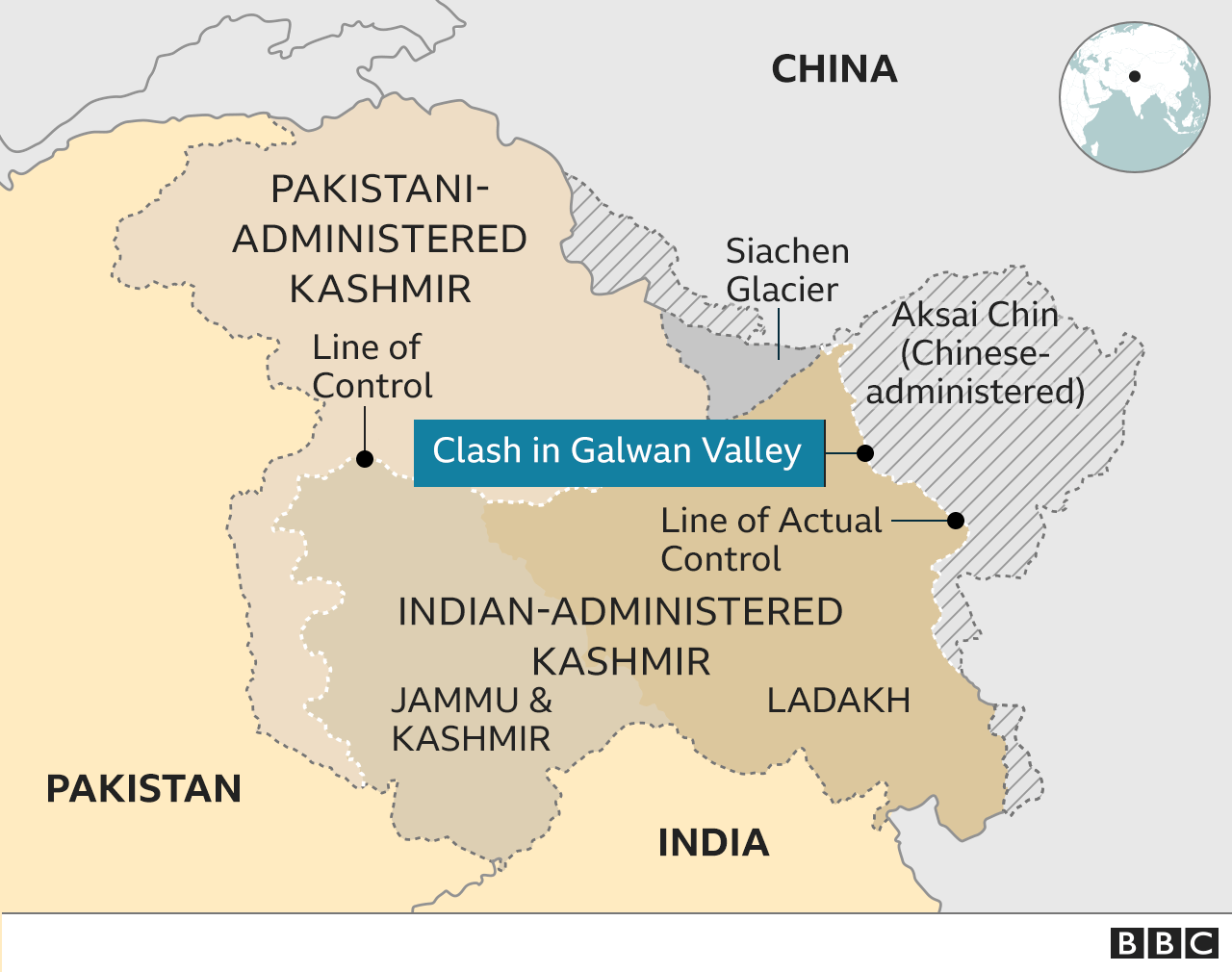
by Basma Khalil 16 June 2020
China and India have a history of border disputes with each other. In 1962, both countries found themselves in war over fringe of Aksai Chin. Later in 1967 pressures raised as a result of Nathu La and Cho La military conflicts at the Himalayan border. Similar incident occurred which almost looked like a military stalemate in 2017 at Doklam. Recently, China and India engaged in a border skirmish at the Galwan River valley where India constructed a road. China claims Galwan River as part of Chinese territory. The dispute formally started in first week of May 2020 along the Himalayan region of Ladakh but had been taking shape over the past few weeks, at multiple locations along the Line of Actual Control (LAC); a facto border, raising tensions between the two nuclear-armed neighbors.
Both the states claim certain areas along the LAC, which contributes to the border clashes between them. In this clash the major concern of China is to stop India from building road infrastructure and increasing military concentration along the LAC. Heavy military concentration can pose a threat to the trade routes because such road infrastructure can increase Indian access and movement towards LAC. Across the LAC Aksai Chin is an important connector between Xinjiang and Tibet for China. It has certain importance as trade routes of BRI and is equally important for CPEC project. In the recent standoff, troopers from the two sides have camped out outdoors in the Galwan Valley in the high-elevation Ladakh setting, over the intrusion by Indian forces in the contested fringe. On both sides of LAC, India and China have burrowed down emplacements. Chinese trucks are moving its arms into the zone which is raising apprehension of a long faceoff. Chinese Foreign Ministry spokesperson’s office stated that China has committed to provide the security to its national territorial sovereignty and will also ensure peace and stability in the China-India border areas.
To resolve and to control border dispute, military talks between Indian and Chinese commanders have failed. Observing this situation the US President offered to mediate between China and India but China rejected Trump’s offer for mediation saying that there was “no need for a third-party intervention”. Chinese Foreign Ministry spokesman Zhao Lijian also said that China and India can mutually resolve their issue through dialogue and consultation between them. He also stressed that there is proper border related mechanism and communication between China and India. In Sunday’s release on 7th June 2020, Indian authorities stated that; to ensure peace and tranquility in the border areas both countries agreed to continue the military and diplomatic engagements
In the whole scenario it will be logical to see how Pakistan reacted to the situation. As a matter of fact, there was no considerable response which came out from Pakistani side but as an ally state to China; it was obvious that Pakistan will show its support for China. It was evident in the statement of foreign Minister Shah Mahmoud Qureshi where he said that China cannot remain ignorant towards India’s illegal constructions of roads in Ladakh. He also warned about India’s aggressive behavior towards its neighbors that could put regional peace and security at stake. Prime Minister of Pakistan also criticized the Modi regime and Hindutva Ideology and expansionist policies of India. He stated that India’s aggressiveness is a threat to India’s neighbors. India has border disputes with Nepal, China, and Pakistan and is being constantly threatened with false flag operation. Such continuous arrogant behavior will not be tolerated. These statements from the senior leadership of Pakistan are an effort to awaken international community and be vigilant about Indian actions. India is being encrusted with embarrassment at every level and the best policy it has adopted to divert attention from all these issues is to take action against Pakistan, to win hearts of Hindu nation through anti-Pakistan policies and hide their failures. Keeping in view the nature of present Indian government, DG ISPR stated that; “Indian aggression aimed towards Pakistan will be responded with full capacity and no one should have doubt about this”. We are ready to respond in any situation that India might create. Mainly the concerns of Pakistan is to preserve its internal and external security and sovereignty and the other to reserve its triumph in terms of CPEC as a party to Chinese great economic project and security of CPEC is the biggest concern of Pakistan and China. The illegitimate constructions by India are biggest concern for China especially because it’s a security threat for China’s road networks of Belt and road Initiative and CPEC as well.
The writer is working as Research Affiliate at Strategic Vision Institute Islamabad, a non-partisan based out of Islamabad.
